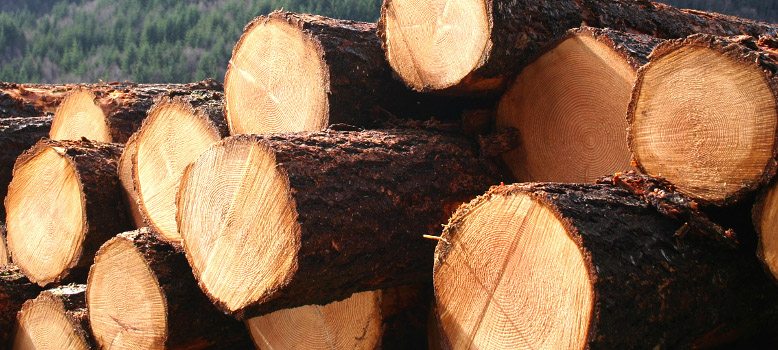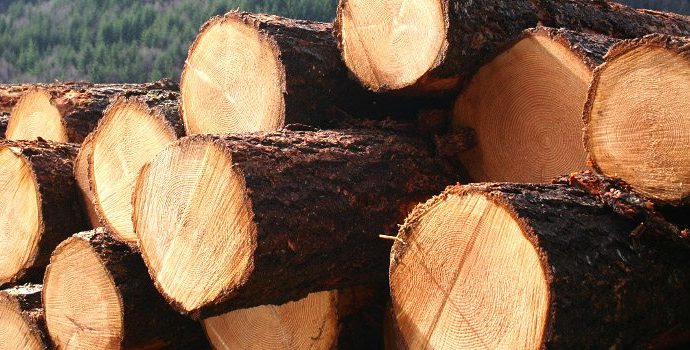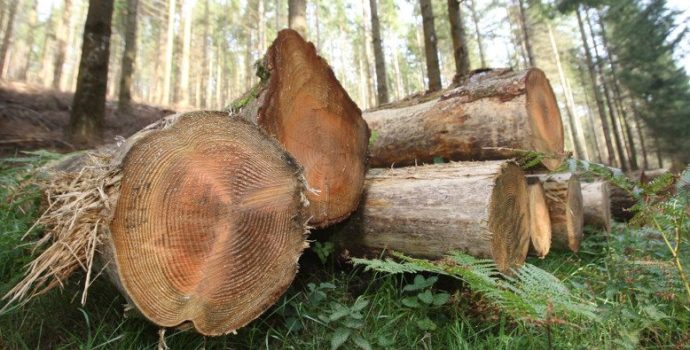Forestry Reports
Forestry Council Report September 2024

- Market Review
- The Forestry Weekly Dashboard showed that as of the end of August 2024, 997 hectares of new forest have been planted and 44 km of forest roads constructed. Afforestation licences issued to establish 2,769 hectares under the Afforestation scheme and 303 under the Native Tree Area scheme. Twenty-eight private felling licences issued compared with 71 Coillte felling licences.
Figure 1. Forest Licensing Dashboard (Week 16 August 2024)
- Activity since last National Council
- The Department of Agriculture, Food and Marine (DAFM) opened an Ash Dieback Action Plan, which includes an additional €79.5 million of funding to pay a new Climate Action Performance Payment (CAPP) of €5,000 per hectare to those impacted ash plantation owners who apply under the Ash Dieback Reconstitution scheme.
- The Ash Dieback Reconstitution scheme provides a €2,000 clearance grant and forestry.
- There has been a mixed reaction to the announcement, with some farmers with older/larger plantations disappointed with the CAPP payment as it does not adequately reflect the financial loss incurred, while for some farmers with younger/smaller plantation the payment provides some financial relief.
- The payment is available to all ash plantation owners that availed of the Ash Dieback Reconstitution schemes.
- The overall package for ash plantation owners is more than €230 million.
- Background information on the grant aided ash plantations including age profile, area, number of farmers impacted and area still within premium.
- The DAFM opened a Climate Resilient Reforestation Pilot Scheme. There are three separate Elements on offer: Reforestation for Continuous Cover Forestry, Reforestation for Native Forests and Reforestation for Biodiversity and Water.
- Grant rates for each element.
Element 1: Reforestation for Continuous Cover Forestry total of €1,800/ha.
Element 2: Reforestation for Native Forests: a) High Ecological Priority Area total of €4,000/ha.
b) All other sites total of €2,225/ha.
Element 3: Reforestation for Biodiversity and Water total of €2,500/ha
- The first instalment, representing approximately 75% of the total grant due, will be payable immediately after replanting when the Form 2 and all other relevant documentation are submitted. The second instalment (25%) will be payable not sooner than 4 years after replanting.
- In addition to grant aid, approved applicants can also avail of Payments for Ecosystem Services (PES) premia, over a 7-year period, which apply for each of the three elements of the Scheme.
- There has been negative feedback to the announcement of the scheme especially for commercial forests where a setback will apply, and the area is not included in this scheme.
- IFA wrote to Minister Hackett to seek a meeting on the Climate Resilient Reforestation Pilot Scheme and to discuss our concerns.
- IFA Budget Submission for Farm Forestry prioritised:
- Forestry & Capital Acquisition Tax (CAT)/Stamp Duty Relief. Land with forestry is currently defined as being agricultural for CAT Agricultural Relief, providing those trees are being grown on over 75% of the land; if they cover a smaller amount of the land, the Relief cannot be applied unless the land is split into separate folios of forestry and agriculture.
- However, with Stamp Duty, land with woodlands growing on a commercial basis does not qualify for reliefs and is subject to the 7.5% rate. Currently the differing definitions cause unnecessary complications and complexities and act as a barrier to farmers investing in forestry. To overcome this barrier IFA proposes:
- If any percentage of the farm is dedicated to forestry, it should be defined as agricultural land and the CAT AgricFFSultural Relief applied to the whole farm.
- Where a non-farmer buys forestry, the normal commercial rate of stamp duty should apply to the full value of land and timber. This is required to ensure forestry remains primarily in the hands of genuine farmers.
- The reintroduction of a farmer premium differential in the new programme has done little to restore confidence or revive farmers interest in planting, as the substantive farmers concerns with regards to excessive regulatory burden that is reducing the viability of forestry on farms. The reality is that many farmers no longer view forestry as a safe investment, the risks associated with committing their land in perpetuity have become too great.
- New measures are needed to reverse the decline in afforestation, to de-risk the investment and restore confidence, while ensuring a balanced regional spread of forestry is achieved. IFA proposes:
- The proposed Payment Ecosystem Service (PES) payment under the new programme will require farmers to further erode productive area to qualify for the payment. This is unacceptable and needs to be amended before it is introduced. Farmers should be paid to manage the land they are required to provide as areas biodiversity enhancement, broadleaves and environmental requirements. They should not be required to further erode productive area to qualify for a payment. The PES rate should reflect the income foregone from timber production and must be extended beyond the proposed 7 years.
- The introduction of a Harvesting Plan Grant to assist forest owners with the increased costs and requirements associated with applying for a felling licence.
- The new Ash Dieback Reconstitution Scheme is a significant improvement on previous iterations of the scheme however further improvements are required. This includes flexibility in the payable clearance grant rate for older and more difficult sites, as recommended in the Independent Review of Ash Dieback Response, and a review of the Climate Action Performance Payment (CAPP) for farmers with older and larger ash woodlands.
- The introduction of a Roadside Ash Tree Removal Grant to support farmers to remove diseased roadside ash trees safely is urgently required. The grant should be administered by the Local Authorities, who would be responsible for coordinating the safe removal of the trees by providing grants to support farmers to hire relevant professionals to safely fell these trees.
- The allocation of funding to establish a Forestry Development Agency to drive the industry, such as exists in other natural resource sectors. It would be charged with optimising the performance of the Irish forest industry by providing technical expertise, business support, funding, training and promoting responsible environmental practice. The establishment of this Agency is critical to achieving the afforestation targets.
- The CSO Afforestation Area 2023 report indicates that farmers accounted for less than 50% of total afforestation area in 2023. The CSO Afforestation Area 2023 report shows that afforestation has decreased by 27% with 1,651 ha of new forests established down from 2,273 ha in 2022. For the first time the percentage of broadleaf species planted was higher than conifer species at 54%. The report illustrations that farmers are no longer the main driver of the afforestation programme in Ireland.
- The highest average parcel size of afforested area over the 2007-2023 period was 8.4 ha in 2009. In 2023 it was 5.8 ha which was the lowest average parcel size across the 2007-2023 period.
IFA attended the Irish Forestry Owners event on Mature Conifer forest, management and economics of conifers forests and forestry taxation on the 13th June.
- IFA attended Lakeland Dairies and Western Forestry Co-op event on the Native Tree Area Scheme on the 26th June.
- IFA Farm Forestry met with Coillte for a briefing on the Coillte farm Partnership portfolios on the 27th June.
- IFA attended the Teagasc Forestry Open Day on the 4th July in Oak Park, Carlow.
- IFA Farm Forestry committee met on the 16th July in the Farm Centre and attended a farm walk on Agroforestry on the same day.
- IFA Farm Forestry attended the Tullamore show on the 11th August.
- IFA Farm Forestry Management committee held on online meeting on the 12th August.
- IFA Farm Forestry met the Minister Jack Chambers on the 20th August.
- IFA attended the Teagasc Tree budding Demonstration and Discussion Event on the 22nd August in Kildalton Agricultural College.
- Any EU/COPA developments
- IFA attended an online COPA meeting discussing Deforestation 24th June
- IFA Attended an online EECE event towards a comprehensive water strategy in the context of climate change on the 2nd July.
- Upcoming issues
- To attend the Department Agriculture, Food and Marine Plant Health Stakeholders Engagement Group on the 27th August.
- To attend the Department Agriculture, Food and Marine online webinar on the Implementation of the EU Deforestation Regulation EU 2003/1115 on the 27th August.
- To attend the Hen Harrier Threat Response Plan 2004-2008 on the 10th September.
- IFA will meet Barry Delaney DAFM on the 13th September.
- IFA will meet with Minister Pippa Hackett on the 25th September.
- To attend COPA working party meeting on forestry- forestry house on the 26th September.
- To attend COPA meeting to discuss Multifunctional forests and their role in supporting EU strategic objectives on the 26thSeptember.
- IFA will meet with Jackie Cahill TD and Councillor Kay Cahill to discuss Roadside Ash Dieback Trees on the 30th September.
- IFA has been invited to met with the Irish Forestry Owners. Date not finalised.
- IFA will lobby on the Local and European forestry proposals outlined in the IFA Election Manifesto.



